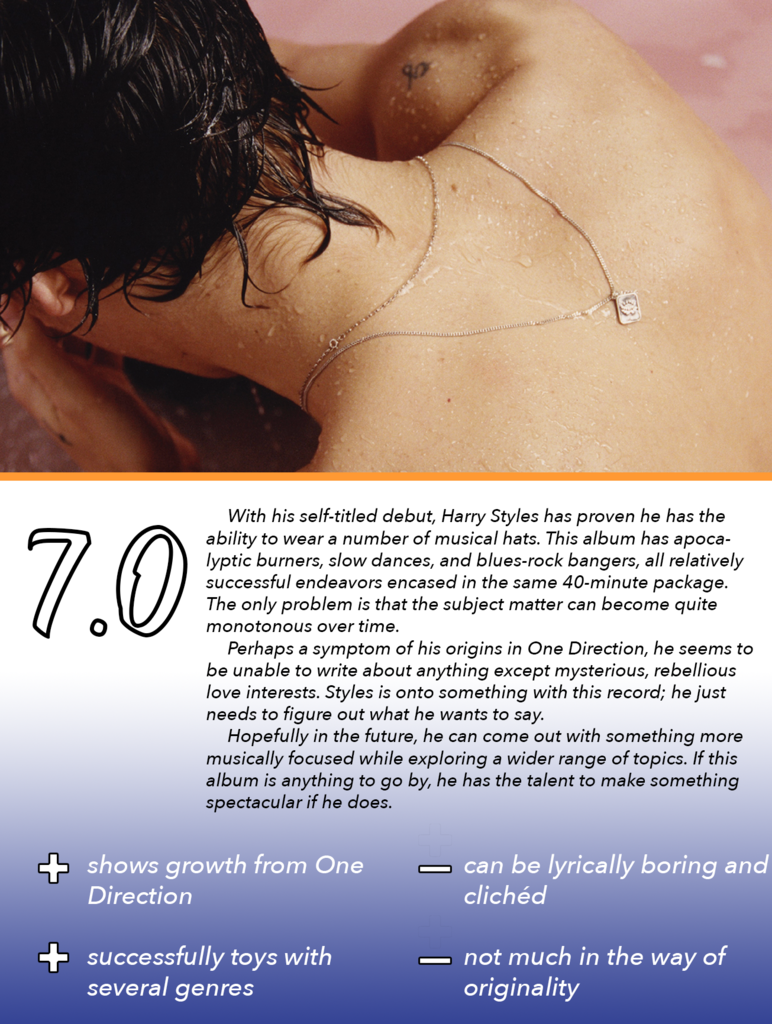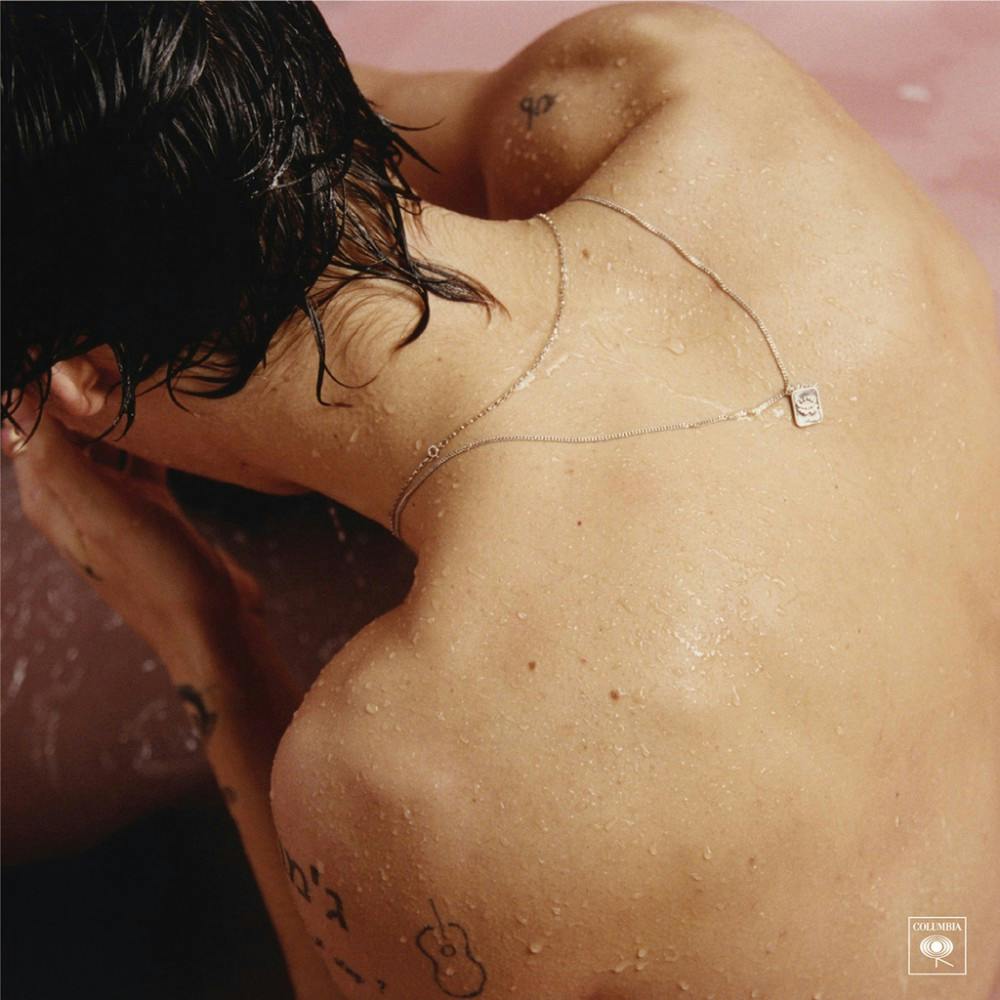Best tracks:
“Meet Me in the Hallway”
“Sign of the Times”
“Sweet Creature”
Recommended if you like:
The Black Keys
The Beatle
Ed Sheeran
Now that One Direction is probably a thing of the past, the boy band’s former members have been slowly branching off into their own individual projects. Zayn Malik, the first to leave the band, came out with the album Mind of Mine last year under simply the name Zayn, led by the fiery R&B super-hit “Pillowtalk”. The rest of the group remained remarkably quiet until last month, when Harry Styles released his debut solo single “Sign of the Times” and exemplified an entirely different kind of fire. Billowing and dramatic, the McCartney-esque epic impressed many who were never fans of Styles’ music under One Direction, and although the general mood of the album turns out to be much different from its singles, the increased maturity is present throughout.
The slower songs
Harry Styles begins with the reverberant “Meet Me in the Hallway”, which is not a typical opening track for an album by a pop star of this magnitude. The song has an almost eerie atmosphere to it, seeming to be drowned out by vocal effects and telling the story of an illicit interaction. The creative production is actually a little out-of-character for the album as a whole, since most of the following tracks adhere to a standard pop-rock production style.
Several more of the album’s slow burners are reminiscent of Styles’ fellow radio singer/songwriters. “Two Ghosts”, for example, could easily fit in the Jack Johnson catalogue. Its comfortable chords and simple imagery could have made it a minor hit in the early 2000s. The final track “From the Dining Table” plays the same card while veering a little closer to Ed Sheeran, describing a lonely night in a hotel room while remembering an old flame.
The brightest and best song on the album is the indie-folk single “Sweet Creature”. One of the happier songs on the record, it gets its entire instrumentation from a playfully fingerpicked acoustic guitar. Later in the song, Styles plays with octave displacements to create drama and keep listeners on their toes. It is simple enough to have a broad appeal, but the bare folksy charm makes it unique in the pop world.
Embracing blues-rock: The tropes, tricks and traps
After “Sweet Creature” ends, the second act of the album begins. “Only Angel” begins exactly as the title suggests, with heavenly piano arpeggios supported by swelling strings and choirs. The buildup continues for almost a full minute, until the clouds finally burst open, revealing...a blues guitar riff? A chorus of “woo hoo”? Where did any of this come from? This is one of the most jarring introductions to a song in recent memory, and even though I want to believe this is part of the singer’s sense of humor, it sort of kills the mood from an objective standpoint.
Still, this more raucous mood is the default mood of the album from this point forward. “Only Angel” and the following track “Kiwi”, along with the earlier track “Carolina”, all sound like they could have been produced by The Black Keys’ Dan Auerbach. Strangely enough though, they’re actually better than the last couple of Black Keys records. When Harry Styles isn’t bluesy, it’s still careful not to feel like it’s directed toward teenage girls like his previous band was. In that sense, it’s a little bit difficult to pinpoint who the target audience of this album is actually supposed to be. Dads of One Direction fans, maybe?
Regardless of intent, the album is actually pretty commendable for its maturity. It was a creative risk for Styles to take the “old soul” approach this early in his life and career, but in a weird way it actually pans out. Even though these sounds might end up sounding dated to some, it’s actually sort of refreshing to hear them coming from a member of a 21st-century boy band.
The lyrical direction is different, but there’s still only one
One of the most unfortunate deficits of improvement on this album is in the lyrics. With few exceptions, this is an album full of surface-level love songs. Most of them are about some Mary Sue character whom Styles finds himself attracted to because she’s “not like other girls” or various tropes to that extent. Yet underneath all the rebellion, she’s always “a good girl” or “an angel” or some other boring sentiment. Underneath it all, this really is meant to be a simple pop album, but that doesn’t mean the standards for creativity should be any lower or that Styles couldn’t have pushed the envelope more if he wanted to. That much is evident in the music.
Even on the songs with more unique premises, Styles can’t help but link the drama back to a simple romantic plot. “Sign of the Times”, while urgent and epic on the surface, is still directed toward a singular person in the fashion of “just take my hand and trust me, we can still survive this somehow”. It works incredibly well on its own, but in context it’s just tiring. The story is the same with “Two Ghosts”, “Ever Since New York”, and plenty of other songs. Lyrically, many songs on this record work on their own, but not when compared side-by-side to nine other songs that are essentially about the same thing.
It’s not always a bad thing to write an album about love. It’s a complex emotion and there’s a lot left to do with it, as Father John Misty proved a couple of years ago with his masterful I Love You, Honeybear. The difference is that every song on that album provided a fresh, unique perspective on his feelings toward romances past and present. Harry Styles just brings back trite, decades-old lines and uses them on nearly every song. This is not something that ruins the album as a whole, but it is a big source of potential for Styles if he continues to release solo music in the future. All he has to do is get this aspect together and he’s got himself a winning formula.

All images from: Billboard
Graphic by: Daley Wilhelm
For more entertainment related content, visit us at Byte Bsu!




















